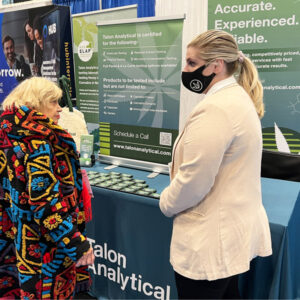
Sometimes behind the scenes but always important, cannabis testing laboratories ensure all products in a dispensary are safe for consumers. These businesses help cultivators and manufacturers ensure their products are the very best they can be and that they meet state regulatory requirements before consumers can buy them. As a critical part of the cannabis supply chain in every legal state, it is important that producers select the right cannabis testing lab to partner with. This guide explains what to look for in a cannabis testing laboratory and the benefits of choosing the right one.
What do cannabis testing laboratories do?
Cannabis testing laboratories use a range of tests to analyze cannabis flower and manufactured products to understand cannabinoid potency, terpene profile, and whether any contaminants are present. The end goal of a cannabis testing laboratory’s efforts are to make sure that cannabis products are safe, effective, and high quality.
“It’s really important for all consumers and patients to have confidence that [their cannabis] is safe to consume and they have accurate dosage information to help them understand how they might react to the product,” said Sarah Ahrens, founder and CEO of the New Jersey-based laboratory True Labs for Cannabis.
Cultivators and manufacturers are generally required by law to partner with testing laboratories to ensure their products meet state standards before reaching the market. To do so, these labs employ a wide range of scientific techniques such as gas chromatography, mass spectrometry, and high pressure liquid chromatography. These techniques can be used in a wide range of different tests, many of which are required under state laws.
“We perform potency testing, terpene testing, full microbial panel … mycotoxins, heavy metals, pesticides, water activity, foreign materials, and moisture content,” said Alison Dixon, sales manager for Talon Analytical, a testing laboratory based in Long Island, New York.
How much does cannabis testing cost?
A full panel compliance test for cannabis simply typically ranges from $600 to $800, according to Ahrens. The price depends on a few factors, including the type of product to be tested. Cannabis flower testing, for example, typically costs less than testing edibles. Additionally, these costs may be influenced by the specific regulatory requirements in a state, what types of tests are required, and the individual analytes to be tested.
What to look for in a cannabis testing laboratory
When you’re looking for a cannabis laboratory to work with, you can usually find a list of licensed operators and the services they provide. In New York, for example, the Office of Cannabis Management (OCM) maintains a list of labs and sampling firms, Dixon said.
“It’ll show a list of what panels and which testing they offer at this time,” she added, “and you’ll be able to contact them individually, see their policies, and their pricing. So, you can make sure you’re comfortable working with them.”
Not all cannabis testing laboratories are created equal. When choosing a testing lab as a partner, cultivators and manufacturers need to ensure they are working with a reliable and efficient facility. There are a few ways to tell that a testing laboratory will deliver on its promises before paying for their services.
Accreditation
One of the most important things to consider when choosing a testing laboratory is whether it maintains ISO/IEC 17025 accreditation. A laboratory that successfully attains accreditation under ISO/IEC 17025 has demonstrated to an independent third-party auditor that they operate up to a high standard and generate valid, reliable results in which customers can be confident.
“[ISO accreditation] is something that is cross-industry; it’s not specific to cannabis, it’s specific to labs,” Ahrens said. “It helps ensure a lab maintains quality operations.”
Adequate facility and equipment
A laboratory is only as effective as its facility and equipment. It’s important to trust that a lab maintains sterile conditions and keeps its equipment properly calibrated at all times. Before starting a relationship with a laboratory, request a site tour to confirm the lab meets these expectations.
“Take a look at how they are set up and whether they’re clean,” Ahrens said. “Do they have good segregation between types of testing in different rooms to ensure there’s no cross-contamination or interference influencing test results?
“There are labs out there operating in a warehouse that’s poorly ventilated, with no concern for employee safety or OSHA standards, conducting all tests in one room,” Ahrens added.
For cultivators and manufacturers who want to ensure accurate test results, a facility tour is an absolute must. Seeing the actual laboratory before sending samples for testing is highly recommended.
Additionally, laboratories should have proper contingency plans in place so operations can continue should something go awry, said Leah DiGiacobbe, lab manager for Talon Analytical.
“Whether it’s personnel or equipment, if something’s going to go down, a lab should have redundancy plans in place,” DiGiacobbe said.

Experienced staff and leadership
A laboratory is a complex and technical environment, so the staff and leadership should have the credentials to back it up. Additionally, cannabis is a unique space, so it’s important that a testing laboratory’s team knows the plant and the industry.
“Look for experienced staff at the lab and understand their background,” Ahrens said. “How much cannabis testing experience do they have? Who is the lead scientific person and charge … and have they worked in cannabis before?”
In addition, consider the laboratory team’s experience with businesses like yours and the circumstances you might find yourself in. The best testing laboratories will be willing to adapt to your needs and be flexible whenever possible.
“For example, if there are certain terpenes the lab doesn’t look for when running a test and a cultivator or manufacturer is focused on enhancing a particular sesquiterpene, are they willing to provide additional services?” Ahrens said.
Efficient turnaround times
Demand often outweighs supply, and as a result, some labs have extremely long turnaround times before delivering results. During the wait, cannabis products can degrade or become subject to contamination, delaying products from reaching the market or skewing results.
“We’ve seen states coming online where there aren’t enough testing labs, so there’s a backlog,” Ahrens said. “Some labs take on too many customers at once and don’t have enough staff or instrumentation to process quickly, so they end up overpromising and under delivering.
Dixon said a typical turnaround time to expect in New York, for example, is about two weeks.
“Make sure that turnaround time meets your needs and helps you get the product to market,” Dixon said. “Usually, that’s around two weeks right now in New York … but everybody’s a little bit different.”
As the industry scales up, she added, you should make sure you partner with a lab that can handle the increased workload.
“Make sure a lab has enough room to grow,” Ahrens said, echoing Dixon’s sentiment.
Red flags to avoid when evaluating a lab
In addition to the above list of things to look for when considering a cannabis testing lab, Ahrens offered the following red flags to avoid when doing your research into what makes a good testing lab partner.
- Lawsuits, fines, and sanctions: If a testing laboratory has been subject to lawsuits, fines, or state sanctions of any kind, their trustworthiness has been called into question in a major way. Consider avoiding any labs with spotty track records that include any of these incidents.
- Doing business under multiple names: A testing laboratory that’s doing business under multiple names in various markets may be trying to hide some less-than-stellar history from its customers. Be wary of a testing laboratory that’s going by multiple monikers, unless the leadership team offers a compelling explanation for it.
- Lack of transparency: If a testing laboratory refuses you a site visit or won’t explain whether they’re accredited or not, consider it a red flag. Testing laboratories need to be trusted partners, and that means open, honest, and forthcoming communication is a necessity.
- Poor responsiveness: If a testing labs leadership team isn’t responsive, consider it a warning. If they’re too busy to reply, they may be too busy to test your samples and send results in a timely manner. Testing laboratories need to offer effective customer service, especially in a sensitive space like the cannabis industry.
If you encounter any of these red flags, reevaluate the testing laboratory you’re considering and determine whether partnering with them is worth the risk.
Benefits of working with a cannabis testing laboratory
When you’ve chosen a reliable cannabis testing laboratory as a partner, you’ll have access to several key benefits, including the following:
- Regulatory compliance: The top reason testing laboratories are important is to meet regulatory guidelines in each state. In most states, there is a litany of contamination testing that must occur, including pesticide screenings, microbial analysis, mycotoxin testing, heavy metals testing, and residual solvent testing, to name a few. In addition, most states require cannabinoid potency testing, and some require terpene profiling as well.
- Early contamination detection/prevention: Beyond regulatory compliance, cannabis testing laboratories are useful in detecting and preventing contamination before it becomes a problem. For example, a testing lab’s team can monitor a grow environment before plants are introduced to identify microbes like mold and mildew. They can also periodically provide environmental testing services throughout the cultivation process, identifying threats to a crop before they spread. Some testing labs may even offer remediation services should contamination be detected.
- Research and development: Testing laboratories can help cultivators and manufacturers perfect their products by giving them deep insights into the compounds in their product. For example, if a cultivator is trying to create a blend of terpenes that give their flower a unique, memorable aroma and flavor, guidance from test results is critical to developing the right profile and a replicable process.
Dixon particularly stressed the importance of R&D testing to make sure your products are on the right track well before you have a large inventory that’s ready to ship.
“Before things are packaged up — maybe 10,000 vapes are all put into their packaging — we think it’s super important for people to send in a test sample and make sure that it would be passing state compliance regulations,” Dixon said. “That’s really a safety precaution that what you’re putting through for final compliance testing, after spending plenty of money and time packaging and getting it ready, has a really good shot of passing.”
Cannabis testing laboratories are often just mentioned when it comes to regulatory requirements, but many go above and beyond to help producers fine-tune their products and ensure their processes yield profitable results.
Don’t cut corners when it comes to cannabis testing
Cannabis testing laboratories represent a layer of quality assurance and validation between producers and consumers. Not only are they critical for passing muster with state regulations so your products can reach the market, but they can help you create a better quality product and build consumer trust. While cannabis testing laboratories represent an added expense, it’s well worthwhile to have a reliable one in your corner. From protecting your cannabis from contamination to helping you create top shelf products, an effective cannabis testing lab is an indispensable partner.
Meet these future partners at CWCBExpo! Held annually in June at the Jacob K. Javits Center in New York City, CWCBExpo is the first B2B show dedicated to cannabis and hemp in the Big Apple. As licensed adult-use dispensaries begin to open their doors and you weigh your options to get involved in the industry, CWCBExpo is just the place to meet your business partners, service providers, and trusted vendors. Registration is now open for our 2023 show!
